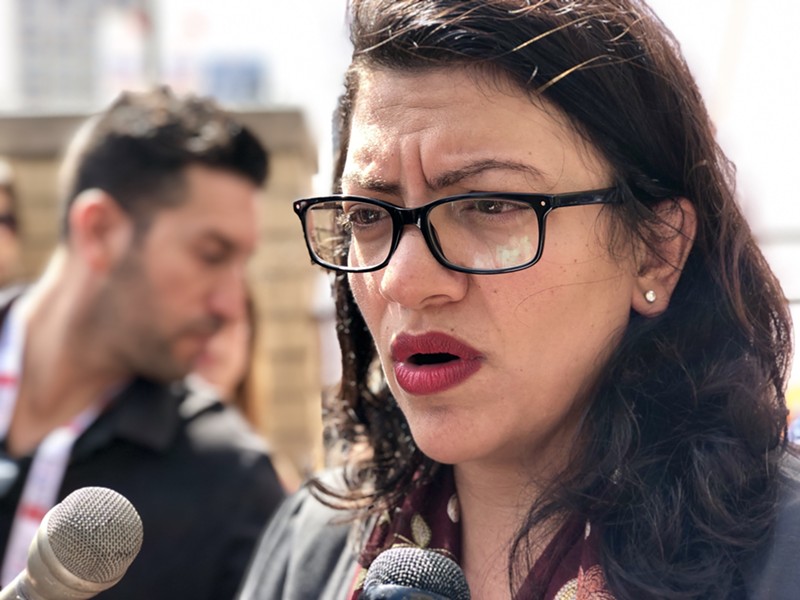Tlaib calls for ‘political courage’ to abolish filibuster and approve voting rights bills
[
{
"name": "GPT - Leaderboard - Inline - Content",
"component": "35519556",
"insertPoint": "5th",
"startingPoint": "3",
"requiredCountToDisplay": "3",
"maxInsertions": 100
}
]
As Republicans in states like Michigan are trying to restrict access to the ballot, U.S. Rep. Rashida Tlaib is calling on her Senate colleagues to abolish the filibuster and approve voting rights legislation before more states.
“For the first time, I think Americans are seeing what the filibuster is,” Tlaib tells Metro Times. “They are realizing how terrible it is. It has been more hurtful in attacking our democracy and our attempts to dismantle systemic racism.”
At stake are the most sweeping voting rights protections in a generation. The Freedom to Vote Act and the John Lewis Voting Rights Advancement Act narrowly passed the U.S. House but have stalled in the Senate under the threat of another GOP filibuster.
Tlaib said the bills are critical after Republican-controlled state legislatures have enacted restrictive voting rules in the wake of the 2020 election, which former President Donald Trump and his zealous supporters have falsely claimed was “stolen.”
In Michigan, Republicans launched a ballot drive that election officials and voting-rights advocates said would make it more difficult to vote. The petition from the Secure MI Vote is intended to enable Republican state lawmakers to circumvent a veto from Gov. Gretchen Whitmer.
The two federal voting rights bills would likely prevent the initiative from being enacted. But standing in the way of the legislation is the filibuster, the Senate rule that requires 60 votes to advance legislation.
Republicans have pledged to oppose the bills, leaving the Democrats, who have a bare majority, without enough votes to pass the legislation.
Efforts to change the filibuster rules have been stymied by two moderate Democrats — Sens. Joe Manchin, of West Virginia, and Krysten Sinema, of Arizona — who have stood in the way. Without any Republican support, every Democrat must be on board to change the filibuster.
For the bills to pass, Tlaib says, “It’s going to take political courage to take on the powers that want to continue to support the filibuster,” which she calls “incredibly unjust” and “a Jim Crow obstruction.”
“If you can get the most votes, that should be enough to proceed,” Tlaib says. “Too much power is given to a minority of representatives.”
Tlaib says abolishing the filibuster goes beyond the election bills. In the past year, the filibuster has doomed measures on criminal justice and immigration reform, abortion rights, and the economy.
For decades, the filibuster has been used to block civil rights bills. Between 1917 and 1994, two political scientist have found that half of the bills that failed because of the filibuster were civil rights legislation, including anti-lynching bills proposed in 1922 and 1935.
In December, Republican and Democratic leaders in the Senate granted a one-time exception to the filibuster to address the debt ceiling. For civil rights activists, it’s frustrating that the Senate can’t get enough votes to make another exception.
“We have proven that we can carve out a filibuster. They did it for the debt ceiling,” Rev. Steven Bland, senior pastor at Liberty Temple Baptist Church and president of the Council of Baptist Pastors for the Detroit area, tells Metro Times. “It’s not that we can’t do it. This moment shows a matter of priority. It’s showing where our values are.”
Bland says it’s “disheartening” and “frightening” that Black people once again have to fight for access to the ballot.
“We have had to fight for the right to vote for a long time,” Bland says. "We shouldn’t be talking about renewing acts. It should be settled law. The fact that we have to keep doing this suggests we’re still trying to figure out whether we want our Black citizens to be a permanent part of our infrastructure.”
Since the 2020 election, Legislatures in 48 states have introduced nearly 400 bills that opponents say would restrict voters’ access to the ballot.
Republican lawmakers in Michigan have introduced dozens of bills that would curtail voting access, impose restrictions on absentee ballots, limit the secretary of state’s ability to assist voters, and make it easier for political appointees to overturn elections.
The Freedom to Vote Act would provide a minimum of 15 early voting days and same-day registration, make Election Day a federal holiday, stop gerrymandered election maps, and expand the ability to vote by mail.
The John R. Lewis Voting Right Advancement Act would restore the protections of the Voting Rights Act of 1965 and enable the government to respond to discrimination at the polls, among other things.
In December, Whitmer, who has vetoed Republicans' bills to restrict voting, sent a letter urging senators to pass the legislation.
Stay connected with Detroit Metro Times. Subscribe to our newsletters, and follow us on Google News, Apple News, Twitter, Facebook, Instagram, or Reddit.







